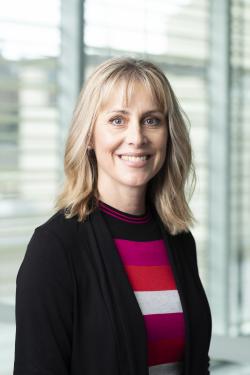
Auschwitz, Poland. Photo by Karsten Winegeart on Unsplash.
UTS will partner with the University of Sydney, Deakin University, the Sydney Jewish Museum (SJM), the Melbourne Holocaust Museum (MHM) and the Adelaide Holocaust Museum and Andrew Steiner Education Centre (AHMSEC) in a first-of-its kind inquiry into the long-term effectiveness of Holocaust education programs in Australia.
Chief Investigator Dr Helena Robinson, a leading museologist and Senior Lecturer with the TD School at UTS, will work with Associate Professors Avril Alba (University of Sydney) and Steven Cooke (Deakin University) to investigate if, and how, learning about difficult pasts contributes to a change in attitudes and actions among individuals and across broader society.
Dr Robinson points to the noticeable rise in the number of school students attending education programs at Holocaust museums nationally, alongside the disturbing increase in antisemitism internationally and broader social and political polarisation.
Holocaust museums are conceived as places where young people engage with history in ways that transform their social awareness and inspire a willingness to act in the face of discrimination. - Dr Helena Robinson
“We need to understand if these museum education programs achieve what they set out to do – this work cannot be based on assumptions” she adds.
Invoking the TD School’s motto ‘great minds don’t always think alike’, Dr Robinson emphasises the advantages of using transdisciplinary research methods to tackle the complex challenge of civics and ethics education: “We want to challenge our assumptions, cross boundaries, and understand the Holocaust museum educational environment and student experiences in a new way. To achieve that, we need historians, ethnographers, educational researchers, museum experts, Holocaust survivors, teachers, and other stakeholders to work together.”
We want to optimise the real-world impact of this project. A TD capability to ensure that our work mobilises diverse research methods and perspectives. By working together we can co-create new ways to design and deliver Holocaust educational programs.

Dr Helena Robinson, a leading museologist and Senior Lecturer at UTS TD School.
The project will evaluate both the immediate and long-term impact of existing forms of Holocaust museum education. The project will also provide an Australian contribution to a growing international area of research by generating insights about the Holocaust, genocide and human rights education that may benefit similar institutions worldwide.
Kevin Sumption, CEO of Sydney Jewish Museum, said: “Each year, over 30,000 students visit the Sydney Jewish Museum to learn about the history of the Holocaust, and the dangers of racism and discrimination.”
“While we have a lot of data about the immediate impact these programs are having on students, we don’t have visibility of how our programs are impacting the values, beliefs and actions of young people – our future active citizens – for the long term.”
“This new collaborative inquiry will deliver important insights that can then be used to improve our programs, so we can make the most far-reaching and long-lasting contribution possible to the human rights landscape of Australia.”
The team were awarded an Australian Research Council Linkage Grant to the value of $566,499.
This research is funded by the Australian Research Council’s Linkage Grant program.

